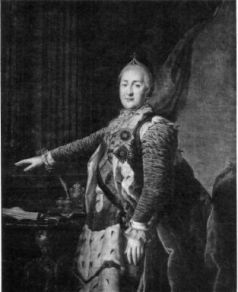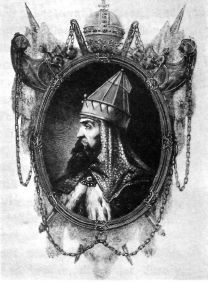Ukrainian gentry, and the characteristic society of his stories and plays stood several rungs lower on the social ladder than the world of Chatsky and Onegin. Gogol's first collection of tales, Evenings on a Farm near Dikanka, which came out in 1831 and received immediate acclaim, sparkled with a generally gay humor and the bright colors of Ukrainian folklore. The gaiety and the folklore, as well as a certain majestic tone and grand manner - much admired by some critics, but considered affected by others - were to appear in Gogol's later works, for example, the famous cossack prose epic, Taras Bulba, which dealt with the struggle of the Ukrainians against the Poles. However, gradually, the real Gogol emerged in literature: the Gogol of the commonplace and the mildly grotesque, which he somehow shaped into an overwhelming psychological world all his own; the Gogol who wrote in an involved, irregular and apparently clumsy style, which
proved utterly irresistible. Occasionally, for instance in the stories Notes of a Madman and A Nose, weird content paralleled these magical literary powers. More frequently, as in the celebrated play, The Inspector General, and in Gogol's masterpiece, the novel Dead Souls, the subject matter contained nothing out of the ordinary and the plot showed little development.
Dead Souls, published in 1842, demonstrates the scope and might of Gogol's genius and serves as the touchstone for different interpretations of Gogol. That simple story of a scoundrel, Chichikov, who proceeded to visit provincial landlords and buy up their dead serfs - serfs were called 'souls' in Russia-to use them in business deals as if they were alive, has been hailed, and not at all unjustly, by critics all the way from Belinsky to Soviet and post-Soviet scholars as a devastating, realistic, satirical picture of rural Russia under Nicholas I. But there seems to be much more to Gogol's novel. The landlords of different psychological types whom Chichikov meets, as well as Chichikov himself, appear to grow in vitality with the years, regardless of the passing of that society which they are supposed to mirror faithfully, for, indeed, they are 'much more real than life.' Russian formalist critics and such writers as Merezhkovsky and Nabokov deserve credit for emphasizing these other 'non-realistic' aspects and powers of Gogol. The great novelist himself, it might be added, did not know what he was doing. His withering satire, applauded by the opponents of the existing system in Russia, stemmed directly from his weird genius, not from any ideology of the Left. In fact, in the second volume of Dead Souls Gogol tried to reform his characters and save Russia. That project, of course, failed. Still trying to resurrect Russian society, Gogol published in 1847 his unbelievably naive and reactionary Selected Passages from Correspondence with Friends, which suggested, for example, that serfs should remain illiterate and shocked educated Russia. Gogol attempted also to find salvation for himself - and, by extension, for Russia - in religious experience, but to no avail. He died in 1852 after a shattering nervous breakdown when he burned much of the sequel to the first volume of Dead Souls.
Karamzin, Zhukovsky, Krylov, Griboedov, Pushkin, Lermontov, and Gogol were by no means the only Russian authors in the reigns of Alexander I and Nicholas I. While no extended discussion of the subject can be offered in a textbook, it should be realized, for instance, that Pushkin did not stand alone, but was the outstanding member of a brilliant generation of poets. Again, the prose writers included, in addition to those already mentioned, the magnificent narrator of provincial gentry life, Serge Aksakov, and other gifted authors. Moreover, pre-reform Russia saw much of the work of another supreme lyric poet who has already been
mentioned, Theodore Tiutchev, as well as the first publications of such giants of Russian and world literature as Turgenev, Dostoevsky, and Tolstoy. It was a golden age.
Ideologies
In spite of the reaction of the last part of Alexander's reign and the steady repression under Nicholas, the first half of the nineteenth century proved to be creative not only in literature but also in Russian political and social thought and in the building of ideologies in general. Herzen could well refer to it as an amazing period of outward political slavery and inward intellectual emancipation. Again Russia profited from its association with the West and from the work performed throughout the eighteenth century in developing education and culture in the country. As we saw earlier, educated Russians shared in the Enlightenment, and indeed, after the outbreak of the French Revolution, produced the first Russian martyrs of the radical ideas of the Age of Reason, such as Novikov and especially Radishchev. Eighteenth-century liberalism or radicalism persisted in the nineteenth century in groups as different as Alexander I's Unofficial Committee and the Decembrists. But on the whole the intellectual scene began to change drastically. Romanticism and German idealistic philosophers replaced the Enlightenment and French philosophes as guides for much of European thought. The new intellectual Zeitgeist affirmed deep, comprehensive knowledge - often with mystical or religious elements - in opposition to mere rationalism, an organic view of the world as against a mechanistic view, and the historical approach to society in contrast to a utilitarian attitude with its vision limited to the present. It also emphasized such diverse doctrines as struggle and the essential separateness of the component parts of the universe in place of the Enlightenment ideals of harmony, unity, and cosmopolitanism. And it stressed the supreme value of art and culture. In the new world of romanticism such strange problems as the true nature of nations and the character of their missions in history came to the fore.
Romanticism and idealistic philosophy penetrated Russia in a variety of ways. For example, a number of professors, typified by Michael Pavlov, who taught physics, mineralogy, and agronomy at the University of Moscow, presented novel German ideas in their lectures in the first decades of the nineteenth century. Educated Russians continued to read voraciously and were strongly influenced by Schiller and other brilliant Western romanticists. Of course, the subjects of the tsar were also Europeans and thus could not help but be part of European intellectual movements. While some Russians showed originality in developing different currents of Western thought, and while in general the Russian response tn romantic

Ministries opposite the Winter Palace, Leningrad, 1819-29.
Cathedral of Our Lady of Kazan in Leningrad, 1801-11.


Ivan the Terrible and His Son by Repin.
View of the Admiralty, 1806-10, and St. Isaac's Cathedral, 1768-1858, Leningrad.


Petrodvorets (Peterhof), summer palace built by Peter the Great, 1722-50, near Leningrad.
The Cossacks of the Zaporozhie Writing a Letter to the Turkish Sultan by Repin.


Cathedral of St. Dmitrii, 1194-7, in Vladimir.
A church in ancient Suzdal.


Ivan the Terrible

Catherine the Great

Peter I, the Great














